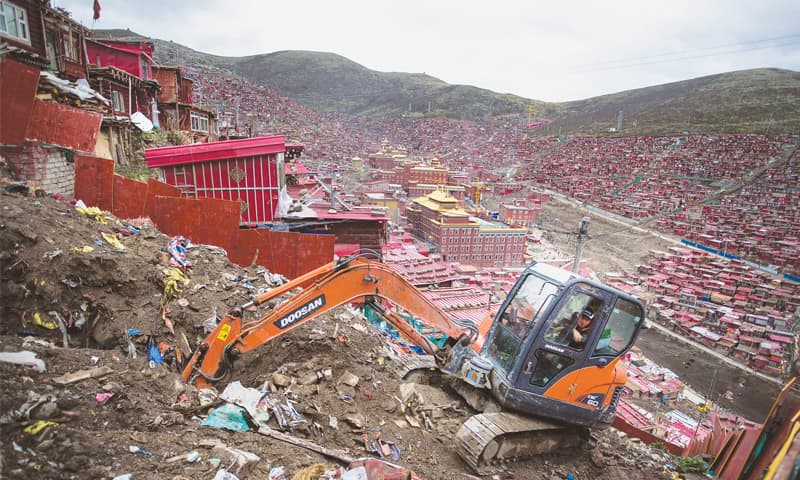The biggest Tibetan Buddhist site which is populated densely on the west bank of the river through Yarchen Gar near Eastern Tibet has been reduced to nothing by China. The Chinese government has reduced almost half of this region to bare ground, as reported by the London based NGO Free Tibet. The monks and nuns who use to inhabit this region have also been displaced from their homes.
The Yarchen Gar was established in 1985 and is a Buddhist monastery that had close to 10000 people living in it.
A wave of demolitions has been taking place in this region since August 2019. This is an attempt by Chinese communist party authorities to decimate the inhabitants of this area. Most recently about 70 nuns were evicted from there to their native county of Jomda, and at least 3500 have been removed on an overall basis.
Those who do not denounce the Dalai Lama and accept the Communist Party’s ideals are put in “re-education centre” (read concentration camps).
The systematic relocation and forced displacement of the #Tibetan population continues, as Chinese authorities issue new restrictions at the Yarchen Gar monastery in Kardze County. #Tibet #China #Occupation #humanrights #Buddhism
The full story at:https://t.co/A744LbBLwy
— Free Tibet (@freetibetorg) September 26, 2018
USCIRF Chair Tenzin Dorjee called #China's restrictions on Yachen Gar, a Tibetan #Buddhist Center in Sichuan Province, an “egregious violation of the freedom of religion.”
Story from @RadioFreeAsia: https://t.co/M45NO4RLTJ #Tibet #ReligiousFreedom
— USCIRF (@USCIRF) June 12, 2019
First, thousands of Buddhist monks & nuns expelled by PRC from Yachen Gar Buddhist complex, now the complex itself is being demolished. https://t.co/TT7F812tU8… via @RadioFreeAsia https://t.co/gIzpkJSfO3 via @RadioFreeAsia
— Kenneth Weinstein (@KenWeinstein) August 29, 2019
Earlier reports in 2019 said that the Chinese authorities closely monitor the monks’ movements and check on all outside visitors.
Now, homes have been demolished and hotels and parking lots have been constructed in their place in order to bring in more tourists from mainland China to this area.
(Source: Zee5, FreeTibet.org)

